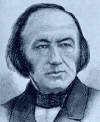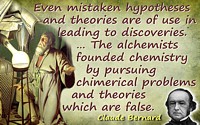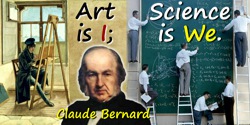 (source)
(source)
|
Claude Bernard
(12 Jul 1813 - 10 Feb 1878)
French physiologist who helped establish the principles of experimentation in the life sciences. His Introduction to the Study of Experimental Medicine (1865) is a scientific classic.
|
Claude Bernard Quotes on Research (7 quotes)
>> Click for 90 Science Quotes by Claude Bernard
>> Click for Claude Bernard Quotes on | Belief | Cause | Discovery | Experiment | Fact | Find | Great | Hypothesis | Idea | Knowledge | Life | Men Of Science | Mind | New | Observation | Phenomenon | Reasoning | Science | Seeking | Statistics | Theory | Truth | Understanding |
>> Click for 90 Science Quotes by Claude Bernard
>> Click for Claude Bernard Quotes on | Belief | Cause | Discovery | Experiment | Fact | Find | Great | Hypothesis | Idea | Knowledge | Life | Men Of Science | Mind | New | Observation | Phenomenon | Reasoning | Science | Seeking | Statistics | Theory | Truth | Understanding |
In these researches I followed the principles of the experimental method that we have established, i.e., that, in presence of a well-noted, new fact which contradicts a theory, instead of keeping the theory and abandoning the fact, I should keep and study the fact, and I hastened to give up the theory.
— Claude Bernard
From An Introduction to the Study of Experimental Medicine (1865), as translated by Henry Copley Greene (1957), 164.
It is that which we do know which is the great hindrance to our learning not that which we do
not know.
— Claude Bernard
Remark to his friend Gambetta, as quoted in Sir Michael Foster, Claude Bernard (1899), 206
Observation is a passive science, experimentation is an active science.
— Claude Bernard
As given, for example, in Fielding Hudson Garrison, An Introduction to the History of Medicine (1929), 15. Webmaster has not found these words verbatim in a primary source, and believes there are summary of an idea expressed in a longer passage. See the quotation beginning “In sciences of observation,” elsewhere on this web page. From Introduction à l'Étude de la Médecine Expérimentale (1865); as translated by Henry Copley Greene, in An Introduction to the Study of Experimental Medicine (1927), 18.
Speaking concretely, when we say “making experiments or making observations,” we mean that we devote ourselves to investigation and to research, that we make attempts and trials in order to gain facts from which the mind, through reasoning, may draw knowledge or instruction.
Speaking in the abstract, when we say “relying on observation and gaining experience,” we mean that observation is the mind's support in reasoning, and experience the mind's support in deciding, or still better, the fruit of exact reasoning applied to the interpretation of facts. It follows from this that we can gain experience without making experiments, solely by reasoning appropriately about well-established facts, just as we can make experiments and observations without gaining experience, if we limit ourselves to noting facts.
Observation, then, is what shows facts; experiment is what teaches about facts and gives experience in relation to anything.
Speaking in the abstract, when we say “relying on observation and gaining experience,” we mean that observation is the mind's support in reasoning, and experience the mind's support in deciding, or still better, the fruit of exact reasoning applied to the interpretation of facts. It follows from this that we can gain experience without making experiments, solely by reasoning appropriately about well-established facts, just as we can make experiments and observations without gaining experience, if we limit ourselves to noting facts.
Observation, then, is what shows facts; experiment is what teaches about facts and gives experience in relation to anything.
— Claude Bernard
From An Introduction to the Study of Experimental Medicine (1865), as translated by Henry Copley Greene (1957), 11.
The goal of scientific physicians in their own science … is to reduce the indeterminate. Statistics therefore apply only to cases in which the cause of the facts observed is still indeterminate.
— Claude Bernard
From An Introduction to the Study of Experimental Medicine (1865), as translated by Henry Copley Greene (1957), 139.
We must remain, in a word, in an intellectual disposition which seems paradoxical, but which, in my opinion, represents the true mind of the investigator. We must have a robust faith and yet not believe.
[Often seen summarized as: The investigator should have a robust faith—and yet not believe.]
[Often seen summarized as: The investigator should have a robust faith—and yet not believe.]
— Claude Bernard
Introduction to the Study of Experimental Medicine (1865). In Alan S. Weber, Nineteenth Century Science: a Selection of Original Texts (2000), 333.
When entering on new ground we must not be afraid to express even risky ideas so as to stimulate research in all directions. As Priestley put it, we must not remain inactive through false modesty based on fear of being mistaken.
— Claude Bernard
From An Introduction to the Study of Experimental Medicine (1865), as translated by Henry Copley Greene (1957), 164-165.
See also:
- 12 Jul - short biography, births, deaths and events on date of Bernard's birth.
- Claude Bernard - context of quote The alchemists founded chemistry - Medium image (500 x 350 px)
- Claude Bernard - context of quote “The alchemists founded chemistry” - Large image (800 x 600 px)
- Claude Bernard - context of quote The experimenter - Medium image (500 x 350 px)
- Claude Bernard - context of quote The experimenter - Large image (800 x 600 px)
- Claude Bernard - context of quote Make experiments to … control our ideas - Medium image (500 x 350 px)
- Claude Bernard - context of quote Make experiments to … control our ideas - Large image (800 x 600 px)



 In science it often happens that scientists say, 'You know that's a really good argument; my position is mistaken,' and then they would actually change their minds and you never hear that old view from them again. They really do it. It doesn't happen as often as it should, because scientists are human and change is sometimes painful. But it happens every day. I cannot recall the last time something like that happened in politics or religion.
(1987) --
In science it often happens that scientists say, 'You know that's a really good argument; my position is mistaken,' and then they would actually change their minds and you never hear that old view from them again. They really do it. It doesn't happen as often as it should, because scientists are human and change is sometimes painful. But it happens every day. I cannot recall the last time something like that happened in politics or religion.
(1987) -- 


